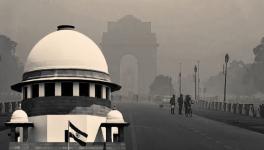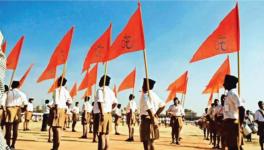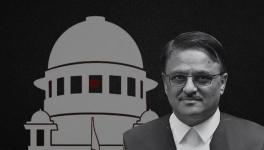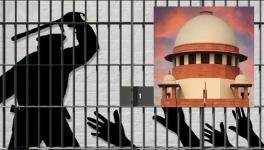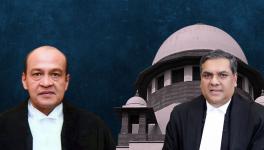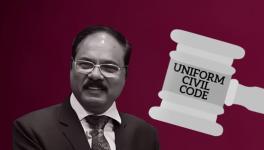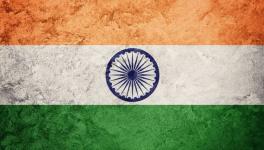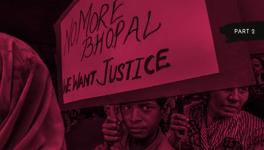O'Dwyerism in India: The Courage and ‘Contempt’ of Gandhi and Prashant Bhushan
Indian legal and intellectual circles are currently in the throes of a raging controversy after the Supreme Court convicted leading lawyer-activist, Prashant Bhushan, of contempt of court. Bhushan was convicted on the basis of two Twitter posts in June this year.
In the first impugned tweet of June 27, he had said that future historians will poorly judge the role of the apex court, particularly the last four Chief Justices of India, in safeguarding democracy. In the second tweet from June 29, which is now in focus, he posted a picture of the Chief Justice of India, S.A. Bobde, astride a Harley Davidson superbike. He referred to how it was happening at a time “when he keeps the SC in Lockdown mode denying citizens their fundamental right to access Justice.”
In its judgement damning Bhushan, the SC said: “The Indian judiciary is not just one but the central pillar on which Indian democracy stands...An attempt to shake the very foundation of constitutional democracy has to be dealt with an iron hand. The tweet has the effect of destabilising the very foundation of this important pillar of the Indian democracy.”
Allow me to narrate a tale that is almost a hundred years old, when the fight for India's freedom was taking a new turn. Old tales, as you know, can often be instructive.
It was on April 13, 1919 that the gruesome tragedy of Jallianwala Bagh happened wherein hundreds of Punjabis attained martyrdom. The firing at Jallianwala Bagh was carried out under the command of Brigadier-General Reginald Dyer.
The Lieutenant Governor of Punjab at the time was Michael O'Dwyer, who, by harking back to the phenomena of Ghadar Party and the perceptible undercurrent of revolutionary ardour in Punjab, had first played a proactive role in the formulation of Defence of India Act and later, in 1919, the Rowlatt Act.
Even after the killings at Jallianwala Bagh, O'Dwyer, who held on to his role as Lieutenant Governor between 1913 and 1919, had unleashed various army and police excesses in many districts of Punjab, including using aircraft to bomb civilians, and allowing use of machine guns to quell unrest in Gujranwala.
The anti-Rowlatt Act agitation was pan-Indian in nature. Many were killed or injured in police firings and cannon charges at various places, thousands were incarcerated in jails and millions participated and suffered in the Satyagraha Andolan called by the Congress.
On 22 April 1919, the District Judge of Ahmedabad, B.C. Kennedy, wrote a “private-official” missive to the Registrar of the Bombay High Court, informing him that two advocates, Kalidas J. Jhaveri and Jivanlal V. Desai, had signed a pledge and as per Kennedy, such an action was not in keeping with their responsibilities towards the court.
The Bombay HC issued a notice to the duo on July 12, 1919, and a copy of Kennedy's letter was handed over to Desai, one of the counsels in question. He, in turn, gave a copy to the other respondent, Kalidas Jhaveri.
It was not taken to kindly by Chief Justice Heaton and Justice Kajiji, who, on November 10, 1919, “severely reprimanded” Jhaveri for sharing the copy of the letter. (Ref: Kalidas J. Jhaveri (1919) 22 Bom. L.R. 31.)
Something else happened during the course of this trial too.
Advocate Jhaveri handed over a copy of Justice Kennedy's letter to Mahatma Gandhi, then the Editor of Young India, whose publisher was Mahadev Desai. He was a secretary to Gandhi and also someone who saw the inside of a jail cell many times, either on account of his own writings or for participating in the freedom struggle.
Gandhi found it prudent to publish Kennedy's letter of August 6, 1919, on the front page of Young India, under the very appropriate and rather provocative headline: “O'Dwyerism in Ahmedabad”.
Alongside the letter, on page two of Young India's edition from the same day, Gandhi also thought it fit to pen a detailed editorial comment titled “Shaking Civil Resistors”. In the piece, he argued that it was no one but O'Dwyer who was responsible for destroying peace in Punjab and that this “O'Dwyrean spirit” had travelled far and wide.
Punjabis need to dwell on this approach taken by Gandhi, who, in those days and times, was making public allegations against a brute like Michael O'Dwyer; exactly when the newspaper helmed by a 'great poet' and someone beloved of the people of Punjab was obsequiously towing the regime's line and waxing lyrical about ‘Huzur Viceroy Sahib’.
Mahatma Gandhi wrote that the echo of the same O'Dwyrean spirit was being heard near Bombay (now Mumbai), alluding to the fact that it was the Bombay HC that had issued a notice to the two counsels for having signed a Satyagraha Pledge against the Rowlatt Act and other repressive measures.
In his piece, Gandhi said that by indicting the two counsels for having transgressed judicial norms by signing the pledge, Justice Kennedy had betrayed himself as someone who was guilty of prejudging the issue, and had pronounced the judgement himself in advance. Read how caustic a Mahatma Gandhi could be: “(H)is [Kennedy's] imputation would be ungentlemanly in a stranger and is unpardonable in his case.”
On October 18, 1919, Gandhi, in his capacity as the editor of Young India, was asked by the Bombay HC to explain the publication of the letter and his comments even while the case was subjudice, and that such actions amounted to interference in the judicial process, asking why he must not be held guilty of contempt of court.
Later, the Registrar of the HC wrote to Gandhi that he may offer his explanation before the Chief Justice in his chambers (not court) in the High Court.
Gandhi reverted and said that he was on his way to Punjab and was not in a position to see the Chief Justice on the said date, but would prefer to send his clarification in writing, an offer the Chief Justice accepted.
Trust Mahatma Gandhi to have used the occasion to lay it on thick. In his clarification dated October 22, 1919, Gandhi wrote: “In my humble opinion, I was within the rights as a journalist in publishing (Justice Kennedy's) letter and making comments thereon. I believed the letter to be of great public importance and one that called for public criticism.”
Predictably, the Bombay HC did not gulp down Gandhi's defiant stance, and on October 31, 1919, offered to let Gandhi off the hook “provided he would publish in Young India an apology.” A proforma draft of the apology so demanded was also attached therewith.
Gandhi refused to publish the suggested apology, and said he has handed over the matter to his legal counsel. In yet another letter, from December 11, the Gandhi again reiterated that he shall not be publishing any apology and that, in fact, stated that he “had performed a useful public duty (by publishing Justice Kennedy's letter) at a time when there was great tension and when even the judiciary was being affected by the popular prejudice.”
Lest there was any doubt left in the mind of the Raj, Gandhi thought it fit to underline that at any point in the future, too, “in similar circumstances, he would not act differently, and that he could not conscientiously offer any apology.”
The matter came up for hearing again on February 27, 1920, and Gandhi again underlined his point in a most unambiguous manner: “I have been unable to accept the advice (given by the Chief Justice) because I do not consider that I have committed either a legal or a moral breach by publishing Mr. Kennedy's letter or by commenting on the contents thereof.” He also made it clear that the publication had indeed published the letter at his instance, thus assuming direct responsibility and not deflecting it towards the publisher, Desai.
On his part, Mahadev Desai too refused to apologise, and said the court might punish him if it so desired.
Such was the moral courage displayed by Mahatma Gandhi and Mahadev Desai. Any engaged reading of the judgement proffered by the bench of Justices Marten, Hayward and Kajiji would reflect that in the face of Gandhi and Desai's strong moral stance and refusal to apologise to the court, it was the judiciary that was left unnerved, not knowing what to do next.
The colonial-era judges could not have even thought in their wildest dreams that an enslaved Indian would strike a pose so defiant before the court and would refuse to even offer a simple apology, despite the direct orders of a High Court.
The Court referenced a number of extant judgements of British court, going all the way back to 1746, and concluded that the actions of Gandhi and Desai, in publishing Kennedy's letter when the matter was still being heard in the Bombay HC, were an interference in judicial proceedings, and thus, amounted to contempt of court. Both Gandhi and Desai were held guilty as charged.
The Bombay HC did convict them, but was now left with a cleft-stick in the matter of sentencing them.
A wave of anger was raging in the wake of the Jallianwala Bagh massacre in India. The British Parliament had passed a resolution against General Dyer and a commission had been set up under Lord William Hunter on October 14, 1919, to probe the tragic episode. Rabindranath Tagore had returned his title of 'Sir', renouncing his knighthood in protest against the massacre. The Congress had convened its annual session at Amritsar that year.
Eventually, the Bombay HC took the meek road and chose to issue a “severe reprimand” to Gandhi and Desai, asking them not to repeat such behaviour again.
In the case currently engaging the country's attention, Prashant Bhushan has echoed the words that Gandhi had uttered in a different case on March 18, 1922 in the District Court of Ahmedabad while facing the charges of sedition ( along with Shankarlal G. Banker ) before C. N. Broomfield District and Sessions Judge Ahmedabad "I do not ask for mercy. I do not plead any extenuating act. I am here, therefore, to cheerfully submit to any penalty that can lawfully be inflicted upon me for what the Court has determined to be an offence, and what appears to me to be the highest duty of a citizen."
During the Champaran Satyagraha in Bihar, Gandhi had said in a court of law that he had not done anything wrong in waging an agitation for the rights of farmers, and he shall not seek bail, come what may. Such was the commitment that made Gandhi what is known as today. Many dimwits often rage blindly against Gandhi in Punjab. Some people in Punjab forget what Bhagat Singh wrote about Gandhi:
“In one way, Gandhi'ism, while remaining fatalist in its approach, does try to reach out to some extent to revolutionary ideas, primarily because it depends upon public action, even though it is not for the public. By drawing the workers into the movement, he (Gandhi) has put them on the path that will lead towards a workers' revolution...The revolutionaries should concede to this 'apostle of peace' his rightful place."
Gandhi, Sohan Singh Bhakna, Bhagat Singh, Jawaharlal Nehru, Subhash Chandra Bose and many others were political beings in their own right while they were leading the freedom struggle.
They each had their own politics, but the norms they set for public life and the bar they fixed for moral courage, serves us till this day and time. They displayed superb courage in difficult historical circumstances. It wasn't possible without a deep commitment to their convictions.
We are passing through a difficult period in history today. We need leaders and journalists the likes of Gandhi who can call out the bluff of the “O'Dwyerism” of our times. If the Mahatma was alive today, he would have said in a voice resonating with courage that the spirit of O'Dwyerism has proliferated all across this country. We must never forget that it were the followers of the spirit of O'Dwyerism who murdered him.
The writer is a Sahitya Akademi Award winner and the Editor of Punjabi Tribune.
Get the latest reports & analysis with people's perspective on Protests, movements & deep analytical videos, discussions of the current affairs in your Telegram app. Subscribe to NewsClick's Telegram channel & get Real-Time updates on stories, as they get published on our website.










